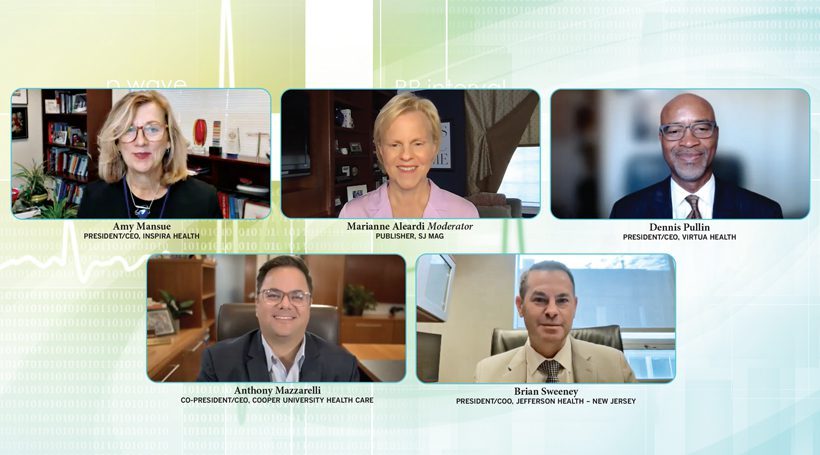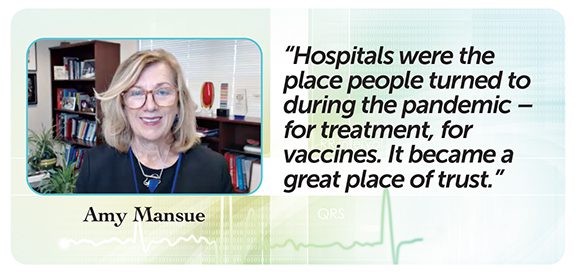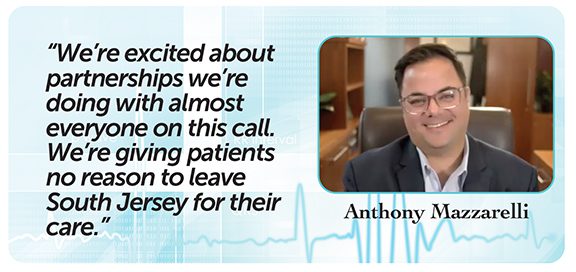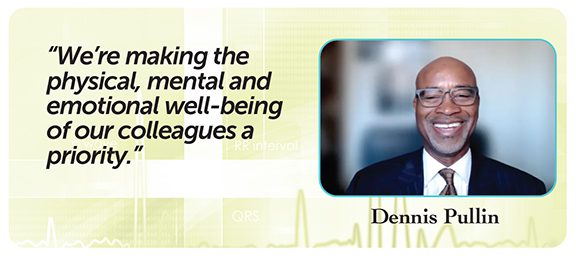Presented by
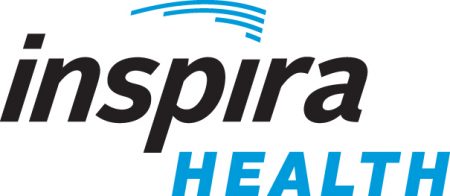
It’s quite possible that, over the past 3 years, this month’s roundtable guests have seen more professional challenges than leaders in perhaps any other industry. And to top it off, the challenges these 4 hospital CEOs faced had life and death consequences – literally. And yet, here they are once again, talking about how they conquered a constant unknown and dove in to do what was needed. Here they are, once again, ready to move into the future with exciting projects and plans, all designed to make their communities, and the people in them, safer, happier and healthier.
Participants:
Marianne Aleardi, Moderator, Publisher, SJ Mag
Amy Mansue, President/CEO, Inspira Health
Dennis Pullin, President/CEO, Virtua Health
Anthony Mazzarelli, Co-President/CEO, Cooper University Health Care
Brian Sweeney, President/COO, Jefferson Health – New Jersey
Is Covid over?
People are coming into our hospital, and they have no idea they have Covid. That’s the difference. People were coming in before because they had Covid. Now they’re coming in for things they probably put off during Covid, all those signs and symptoms they ignored, and we’re making the discovery and usually treating Covid first. Then we move forward with the rest of the care plan. I think that is the uniqueness we all are seeing.
Amy Mansue
I think it would be somewhat premature to say Covid is over. We’re going to be living with Covid for quite some time.
Dennis Pullin
We’re moving into an endemic phase, meaning it pops up but doesn’t cause any major spike in deaths, so we learn to live with it. We have a lot of knowledge. We have treatments and vaccinations to help prevent the biggest impact from it, and that combination means when we do enter the endemic phase, we’ll always be looking backwards. I think we’re ready to have that happen.
Anthony Mazzarelli
As we head into winter, I think we’re all concerned about the triple threat of the flu, any Covid surge, and RSV for pediatrics now and the unknown that brings. So avoiding crowded spaces, staying outside, masking if you’re sick, obviously getting tested and staying away from others – those basic public health parameters are all still really important.
Brian Sweeney
Workforce shortages
A third of healthcare workers are thinking about leaving healthcare, and we are not only competing with other healthcare systems, but with every industry out there. Nursing gets the most attention, but really it’s all aspects of the health system.
Anthony Mazzarelli
There is a workforce shortage – this is not new. We had a shortage prior to Covid, and I think we’re seeing the impacts now. But if I had to put my finger on a particular discipline, I would say they’re all equally as short and equally as important for us to fill.
Dennis Pullin
From entry-level positions all the way up, we’re not seeing the same volume of applications for the jobs that usually were easier to fill. There’s a lot more competition at that entry level than ever before. If you’re going to get paid $24 an hour to work at Amazon – in some ways it’s a lot easier than being a transporter on a very busy surgical unit. We are in the process, like most of the nation, of trying to determine how best to send those messages to help people who are attracted to come and serve, and fall in love with healthcare again.
Amy Mansue
The shortages are also affecting the more technically advanced, scientific positions. A great example is Walmart. They are becoming a leader in clinical trials. Previously nobody would have gone to Walmart to be a research coordinator or to coordinate clinical trials. They would have gone to an academic health system like ours. There’s a whole new round of competition that we never faced before.
Brian Sweeney
Recruitment efforts
I think there is a tremendous opportunity for people who are finishing high school or have already graduated to further their education, without the financial worries. Our partnership with Rowan College of South Jersey provides our employees with a 50% tuition discount. That, on top of our existing tuition reimbursement program, means that our employees can take classes for little or no cost to them. We have also updated our hiring policy for certain positions so that people without a high school diploma can join the Inspira team. If they come to work for us, it is with the understanding that we will help them get their GED. This can lead to further educational opportunities and be the start of career that pays a family-sustaining wage.
Amy Mansue
We’re having to rethink, not just recruitment and hiring practices, but retention strategies. We can’t ignore the impact of burnout and some post-traumatic stress that many of our colleagues are dealing with. It’s causing people to choose other industries. We’re losing tenured people who have basically said enough is enough. So we are focused on: How do we keep and nurture the staff we have?
Dennis Pullin
We’ve started an emeritus nurse program. Since the pandemic, a lot of experienced nurses did not want to continue fulltime, but they missed working and caring for patients. So we have partnered senior nurses with nurses who don’t have those years of experience, so they can have some backup as they gain experience and trust and confidence to be much more successful. These shortages are testing us in terms of: How do we create a future workforce that ensures our services are continued uninterrupted, driving the highest quality of care.
Brian Sweeney
We have more job openings than ever before. But we have a big advantage, which is: What we do has a profound purpose. If people are looking to switch jobs because they want more purpose, we want to make sure we are showing them the things we do that are very special and unique in healthcare.
Anthony Mazzarelli
Supporting staff mental health
We’ve been continuing our leadership rounds, interacting with our staff, traveling to our medical group offices, our hospitals. To the extent that there are processes that need to be refined or barriers that exist, we’re making it easy for people to get their work done. The advancement of healthcare technology across our country has been amazing, but it’s brought with it some complexities. We’re trying to make sure we’re making those tools efficient and easy for our clinicians. We don’t want them to spend all their time with a computer, but we want them to be able to interact with patients and families, and bring back that joy which they first sought when they went into the healthcare field.
Brian Sweeney
We’re starting to have conversations about how we get people to focus on their own well-being when they are so involved in the well-being of others. It’s difficult to get someone to go against their natural order. But we have wellness rooms where people can go and decompress and re-energize. And within that room there are resources people can tap into if they need help.
Dennis Pullin
We have the CARE (Compassionate and Resiliency Experience) program, where we provide direct support to all our employees. We started peer support groups – physicians, nurses, advanced practice providers all have their own group. I can’t imagine a peer support group among physicians taking hold pre-pandemic the way it has now. Because of these kinds of programs, we were one of 28 health systems in the country to be named by the American Medical Association to their Joy in Medicine Health System Recognition.
Anthony Mazzarelli
For people who spend most of their life being selfless, self-care can be difficult. If you’re giving care to patients all day long, if you’re taking care of everybody else, you have to make sure you have what you need for all that you do. That’s so important. Sometimes it can be simple things. I’ve set a ban on all weekend emails from the senior team, unless it’s urgent. Little things that let people know they can decompress do matter.
Amy Mansue
Healthcare at the corner store
There was a time when people made their healthcare decisions based on quality and reputation first. But now I think convenience and accessibility are high on the list. Do I think there is a place for Walmart and CVS? I do. But do I think we should sort of acquiesce to it? No, I don’t. Because there will still be times when patients seek out a higher level of care that only we can provide. You don’t hear about Walmart offering ICU services or emergency services or surgical services. To think they’re going to replace us, no, that is never going to happen.
Dennis Pullin
We all want to take the best possible care of patients and have this element of consumerism where we can make sure people get care when they want it. But we have to make sure this doesn’t separate the health system from the way people get care. We have to integrate, for when someone gets sicker and the hospital needs to care for them, we have to see what care was provided to them, so we can then provide the best possible care.
Anthony Mazzarelli
On the business side, one of the practical challenges with the expansion of retail operators is the difference between the for-profit and not-for-profit mindset. All of us are deeply committed to the community. We serve the underserved, we provide care regardless of your ability to pay. We see the for-profit operators target certain areas where they can be profitable. That’s just a fundamental difference of how we think about care.
Brian Sweeney
Right now people aren’t getting all the care they need. If they were, our health outcomes would be much different in South Jersey. So we’re going to integrate, coordinate, but most important, encourage people to access care with a place that’s convenient for them, and we can then work to make sure our health outcomes are better.
Amy Mansue
Keeping people out of the hospital
When you look at our mobile services, it really does provide us with an opportunity to meet patients where they are. Virtua has a mobile pediatric unit and a mobile mammography unit. We have our mobile grocery store and our mobile farmers market, all in an effort for us to reach deeper into the community. To date, these efforts have been extremely successful.
Dennis Pullin
It all starts with screening. We make sure our screening programs are on the ground, and we are reaching people. We each have our own screening vans and wellness vans that go into the community, but it doesn’t matter if people don’t actually use those services.
Amy Mansue
As a practical matter, we’ve been redesigning the care model. There’s been a huge focus on expanding ambulatory services and making sure screening and prevention resources are embedded in clinical practices in communities. A good example is behavioral health. Given the prevalence of behavioral health support within our community, we want to make sure those counselors and those therapists are embedded there, and seen as a resource proactively and not an afterthought. Continuing evolution of the care delivery model is also an opportunity, in terms of prevention and screening.
Brian Sweeney
Hospitals have been focused on this for decades now – this idea that an ounce of prevention is worth a pound of cure and going to people in their communities to provide preventative care. We’ve kind of moved away from that model. We’re trying to get people to respond – to dive in – to the efforts we’re putting out there.
Anthony Mazzarelli
An exciting future project
We’re breaking ground. Last year was the creation of legislation that allowed for elective PCIs – what that translates to is people can have cardiac CATs in their community. Having those services available at Vineland and Mullica Hill – to be able to serve people and keep them close to home – is really a game changer for us. And our new Deptford facility, located right across from the mall, will be a large ambulatory center. We are well on our way to have it open at the end of ’23. We’re excited about that.
Amy Mansue
We’re excited about a bunch of things. One of them is the rapid pace of how we’re coming along with our project at the Moorestown Mall, which will be our largest community-based ambulatory site to date. We’re also excited about our multi-year expansion and the almost $2 billion investment in our new patient towers in Camden.
Anthony Mazzarelli
I’m excited about the expansion of our health plan, Health Partners, in New Jersey. We were fortunate to bring Health Partners into Jefferson Health in the fall of last year. This is the first time we’re going to be able to offer Medicare Advantage to New Jersey residents. I’m very confident, given the history and the data we’ve seen around prevention and total cost of care, that this is going to allow us to continue to expand our value-based programs. We have deep experience with population health, and I’m excited at our ability to improve the outcomes and reduce the total cost of care through the Medicare Advantage plans.
Brian Sweeney
We’re excited about Virtua’s academic affiliation with Rowan University, creating the Virtua Health College of Medicine and Life Sciences of Rowan University. This gives us an opportunity to further strengthen our region as a place to attract and train our workforce of the future. When you look at what we’ll be able to do in terms of training our physicians, nurses and allied health professionals, this not only strengthens Virtua, but also our region, as a destination for attracting people from all over the country to come learn, train and do clinical research.
Dennis Pullin
Do they (still) love their jobs
I absolutely love my job. The pandemic, and now the resultant workforce shortage, will likely be remembered as some of the toughest times our industry has faced in recent memory. And there is an aspect of going through such a tough time – it brought our community together and helped us refocus on correcting a lot of issues within the U.S. healthcare system. So managing change, particularly ushering in new ways to do things that help patients and our team members, makes me love the job even more.
Anthony Mazzarelli
I love my job. It was certainly exciting assuming a new job in the middle of the pandemic, so I’m glad that part is more stabilized. I enjoy developing leadership teams, and coaching and mentoring others. I’ve been able to put much more time and effort into that, which is personally rewarding.
Brian Sweeney
The short answer is yes. One thing that is so special now is, post-Covid, I can meet people and have an entirely different relationship with them. Being out in the community and feeling the depth of South Jersey pride has been really important. The key for us now at Inspira is to double down and make sure we’re creating opportunities for people to stay here, initiatives that will make them fall in love with South Jersey, not just get trained here and leave.
Amy Mansue
Do I still love my job? Absolutely. What other place can you get up and know that every single day you have the opportunity to make a difference in someone’s life? We get to do some very special things, we work with very special people, and we are about doing good. That makes it hard not to love.
Dennis Pullin



